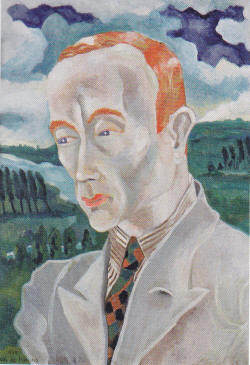

Queer Places:
Bloemendaal Erebegraafplaats
Overveen, Bloemendaal Municipality, Noord-Holland, Netherlands
Nicolaïkerk, Nicolaaskerkhof 8, 3512 XC Utrecht, Netherlands
 Johan Brouwer (Delfshaven, 31 May 1898 – Haarlem, 1 July 1943) was a Dutch hispanologist and author, active as a resistance fighter during the Second World War.
He was one of the participants in the attack on the population register in Amsterdam. At least three of them –
Willem Arondeus, the writer Johan Brouwer and
the tailor Sjoerd Bakker – were
homosexual. Bakker’s last request was to be provided with a pink shirt, and he
instructed his lawyer to reveal his homosexuality after the war. The intention
was to disprove the myth that pansies were cowards.
Johan Brouwer (Delfshaven, 31 May 1898 – Haarlem, 1 July 1943) was a Dutch hispanologist and author, active as a resistance fighter during the Second World War.
He was one of the participants in the attack on the population register in Amsterdam. At least three of them –
Willem Arondeus, the writer Johan Brouwer and
the tailor Sjoerd Bakker – were
homosexual. Bakker’s last request was to be provided with a pink shirt, and he
instructed his lawyer to reveal his homosexuality after the war. The intention
was to disprove the myth that pansies were cowards.
Brouwer was born in Delfshaven and attended the Christian Gymnasium in Rotterdam. As a student, his way of life led him to chronic lack of money, which led to him and his brother committing a bank robbery. Not this fact, but the murder in 1921 of an acquaintance who knew about it and then continued to blackmail them with this fact, led to a long interruption of his study time. He was convicted of the murder and served a prison sentence between 1922 and 1928. He then resumed his studies in Romance Languages and graduated cum laude in Spanish literature, in 1930 at the University of Groningen. Only a year later he obtained his PhD with a thesis on Spanish Mysticism. After his studies he moved with his wife, Betteke Kluyver (1897-1987), a daughter of the Groningen professor of Dutch Albert Kluyver (1858-1938), to The Hague where he taught at various schools. He made study trips to Spain and Portugal, published many scientific works on Spanish literature, translated many Spanish literature from the past and wrote a number of Spanish textbooks. He became a Catholic himself in the 1930s. Through his travels to Spain and the spanish civil war where he clearly chose the Republicans who fought against Franco, he became aware of the threat of war and gave cautionary lectures in the Netherlands about the danger of non-intervention. In 1941, the lecturer in Spanish at the University of Amsterdam, Dr. J. A. van Praag, was fired because he was Jewish. Brouwer was appointed his successor on 14 February 1941. The National Socialist Movement (NSB), however, unleashed a hot-light against him and circulated a scattered note that contained revelations about his past and condemnation. He was then suspended on 12 March 1941. Brouwer immediately applied for dismissal and then devoted himself mainly to illegal work. On 27 March 1943 he participated in the Attack on the Amsterdam Population Register (1943) at the Plantage Middenlaan in Amsterdam. Led by Gerrit van der Veen and together with Rudi Bloemgarten, Willem Arondeus, Sam van Musschenbroek, Coos Hartogh, Henri Halberstadt, Karl Gröger, Guus Reitsma, Koen Limperg, Sjoerd Bakker, Cornelis Leendert Barentsen and Cornelis Roos, he entered the building disguised as a policeman on 27 March 1943 and blew up the building with explosives. Within a week of the attack, Brouwer and several other members of the group were arrested. He was executed in July 1943. In September 1945 his remains were placed at the Cemetery of Bloemendaal. At the initiative of his widow, in 1956 a memorial window was placed in the Nicolaïkerk in Utrecht, made by ds. Piet Kok.
My published books: